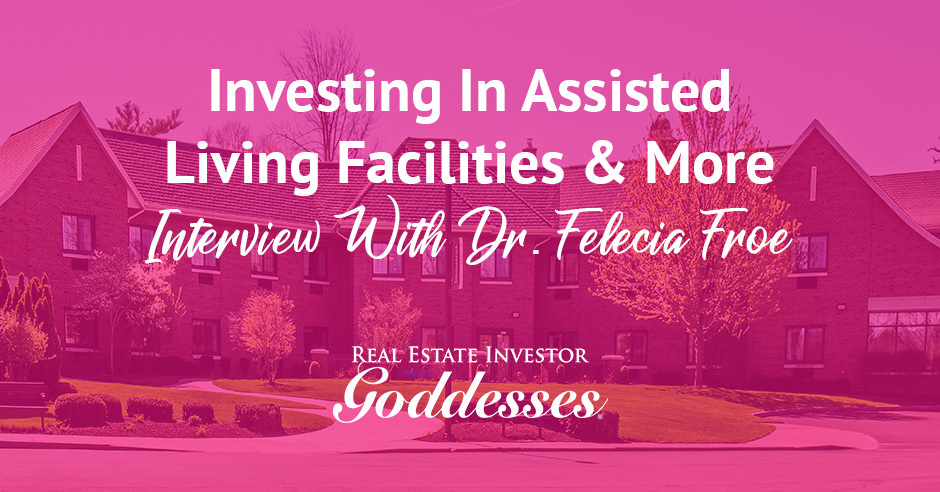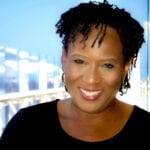
One of the biggest demographic trends we are witnessing today is the sharp rise of the elderly population, with around 120,000 people turning 85 each month. The need to provide shelter and assistance for these elderly people is a huge opportunity for real estate investors who are thinking about investing in residential assisted living facilities. Joining Monick Halm today is Dr. Felecia Froe, who has been tapping into that asset class, owning several such facilities in the Kansas City suburbs. A urologist by profession, Dr. Felecia got into real estate investing in 2004 and has seen her share of ups and downs in the business. She sees the residential assisted living facilities space as a great way to make profit from providing an incredibly valuable service to an underserved demographic.
—
Listen to the podcast here:
Investing In Assisted Living Facilities & More – Interview With Dr. Felecia Froe
I have a great guest with us, as always. Our guest is Dr. Felecia Froe, who is a Chief Urologist. She has been practicing medicine for many years but got into real estate investing in 2004. She realized after reading Rich Dad Poor Dad that she needed to learn more about business and investing. She began real estate investing then. Through her journey, she experienced some ups and downs of the real estate market. She has raised funds and she syndicates. She is providing her investors with solid returns. She’s also passionate about teaching women from all walks of life on how to understand real estate investing. She earned her Residential Assisted Living Specialist certification in 2015 and that is something we are going to focus on.
The residential assisted living facility is an interesting asset class that is writing a huge demographic megatrend. It’s been called the silver tsunami. There are 77 million Baby Boomers and their parents, and 120,000 people per month are turning 85. There might be 4,000 a day. Seventy percent of them need help with their daily living activities. There is a huge opportunity in real estate providing residential assisted living facilities to help these Baby Boomers and their parents. Dr. Felecia Froe is tapping into that. We’re going to talk a lot about that. I’m excited to have you. She’s also a dear friend. Welcome, Felecia. How are you?
I’m doing okay, Monick. Thank you. I’m excited to be here. Thanks for introducing me to the goddesses and making me feel like one. It’s all exciting.
I’m happy to have you here. I know that the purple book, Rich Dad Poor Dad, was part of the impetus for you to get started. Tell us more about that. How did you get started? I know there are a lot of people that read the book and have not had the level of success that you have. What happened for you?
I was in Kansas City at the time. I’m a mover. I get bored with a place and then move on to live somewhere else and find out more about that part of the world. At this time I was in Kansas City, which is where my family is. I was working with some other female physicians and a woman who was in business. She had an insurance company. It was an insurance company that she started. This woman introduced me to the book and business. We’d sit around her table talking about how we can manage this real estate that we were buying and this business that we were starting and all these things. She was my inspiration.
I read the book. A patient introduced me to real estate investing. I can tell you the story of the patient who got me to buy my first property. It was an interesting thing. Carol introduced me to the book. Jamie came into my office, who was my patient. She seemed like she was in her mid-30s and was traveling around the world and doing all these things. I’m like, “What do you do?” She’s like, “We do real estate investing.” She and I talked about that along with her medical things. We got to be friends and we are still friends. My first property was a little three-bedroom and one-bath house. I don’t even remember how we found it. She went with me to look at it. We walked through. She said, “If you don’t buy this, I’m going to buy it. If you buy it, I’m going to let you use my crew to fix it. If you don’t make money on it, I’ll buy it from you.” How could I lose? Here’s the bigger thing, it was $500 down via assumption loan.
You couldn’t lose on that one.
I couldn’t not buy it. There I was and I bought that one. Many things happened after that. That house did well. I can keep talking about the whole situation. We bought eighteen properties in less than two years. We moved for various reasons. We couldn’t keep up with those properties as far as getting them prepared to rent. That was a great lesson learned.
Were you self-managing?
Investing in residential assisted living facilities is a good way to do good and do well at the same time. Share on XYes. My husband and I were doing it. My husband was the contractor to fix them up. He’s a perfectionist. Then 2008 came and a lot of not pleasant things. We ended up losing all of those properties. That was tough. It took me a few years to come back from that one.
I want to talk a little bit about that because you were able to come back. I know a lot of people are afraid of getting started because they’re afraid of losing money, “I’m going to do this. What if I lose these properties? What if I don’t make money?” It’s the most horrible thing. What would you tell them? What advice would you give?
I would say like everything else we do, you have to do it. I know walking seems such a benign example. Look at a baby learning how to walk. They’re not afraid of it. They do it, they fall, they get up, and they go. Money is just a thing. We have to get used to thinking of it as just a thing and not the end of our life if we lose it. If that whole situation hadn’t happened to me, I wouldn’t have learned the things I learned.
What did you learn?
You did a podcast or did a session not so long ago about a team. I learned I need a team. I learned I have to have a team. You cannot be the only one out there ever. There are many people that will help you succeed.
Team is crucial. You guys were doing it by yourself so that definitely made it hard. Probably in the time when you did have the properties though, you were making some money.
It was doing okay. We were doing okay. It was exciting. I was ready to quit medicine. It was going to be all fun and good. We realized that you weren’t as good as you thought you were, there you go.
You learned a lot. One other thing I wanted to highlight is that you were doing all of this while you had a job as a physician. A lot of people think, “I don’t have the time to do it.” How did you find the time?
There are lots of times in my life that I look back and can’t figure out how I managed to get done what I got done. You did what you had to do. The other part of that is I was in out of town position. I was working out of town. I was working in Texas at the time and our properties were in Kansas City. It was all interesting. I honestly think that was part of the mistake. I wasn’t able to pay attention or I didn’t pay attention like I needed to. There are a lot of things in there.

Residential Assisted Living Facilities: Residential assisted living facilities are an interesting asset class that rides a huge demographic megatrend called the “silver tsunami.”
It probably would have helped to have an outside property management while you were doing it. Let’s move forward and talk a little bit about where you are now. You are doing single-family and residential. Now your focus is more on the assisted living facility. Tell us a little bit about assisted living facilities.
As a physician and a urologist, most of our patients are elderly. I’ve had the chance to witness a lot of people my age bringing in their parents, looking, watching, and hearing how that’s taking a toll on them. It’s not that they don’t want to take care of their parents. They want to take care of their father and mother, but we’re in what’s called a sandwich generation. We’re taking care of children and our parents at the same time. It’s hard.
For many of them, thinking about putting their parents in an institution is not something they would even consider. When I think about the big nursing home, I think about it smells like urine, it’s dark and dingy. I have this picture in my head that’s not someplace I would ever have my parents go. I met Gene Guarino a couple of years ago. He’s a guy in Phoenix who teaches and started some residential assisted living facilities. He also started introducing it to the world. I heard him speak and it struck me. It was like something hits you and, “That’s it. That’s the thing.” That made a ton of sense to me.
For those who are not familiar with the residential assisted living facility, it is a single-family house, a larger house that has a number of bedrooms and beds. Elderly residents are moving in. They’re people who need help with their daily living activities like making food, taking baths, and what medication to take. They’re all living in this house. It’s a house that is licensed for that type of service. How much do they pay on average per bed?
It depends. I want to add to what you were saying because that’s perfect. Instead of that institutional feel, it’s a home-like feel. It’s like you’re at home. They know the ratio of the people that are caring for them. It’s a much lower ratio of 3 to 1 or 4 to 1 compared to 12 to 1 for institutional facilities. In the residential care facilities, the payment for a bed can go anywhere from $3,500 up to $10,000 depending on the type of facility that it is. In other words, if you have an upscale house with a gigantic room with attached bathroom in an upscale neighborhood, it may be $10,000 a month. On average, we’re looking at $4,500 to $5,000 for a nice place that you don’t mind to visit your mom and dad.
You’re happy to have them there and knowing they’re well taken care of and surrounded by friends. What’s the average number of beds? I know that it depends on where you are. In California, you can only have about six. In other places, it can be sixteen.
In Missouri where my project is, we could have twelve. We are going to do twelve beds and we’re doing memory care. We are at $6,500 a bed.
With the math, that is how much per month?
For the full facility, it’s $78,000 a month.
You have to be comfortable walking away from a deal that doesn’t make sense anymore. Share on XThat is not bad. By comparison, if you were renting out that single-family home, is it a twelve-bedroom house or do they have to share?
No, it will be a twelve-bedroom house.
You’re trying to rent out a twelve-bedroom house. How much would you get for a regular tenant or a large family per month?
I’m thinking $2,000 or $3,000 a month.
That’s a big difference. That’s a $75,000 difference in terms of what you can get by doing the residential assisted living facilities. That will give people an idea of what this could be monetarily for people. While you are providing an incredibly valuable service, creating a beautiful and wonderful place to live for mom, dad, grandma, grandpa, you are also doing fairly well.
The idea of doing well and doing good is important. We talked about a lot of the different segments of society like our elderly and vets. They deserve to be cared for. That’s what we’re looking at.
You said you have this twelve-bed memory care facility that you are opening up? Where are you in terms of that process now?
It’s not a twelve-bed facility yet. We closed on this five-bedroom house in a town called Shawnee, Kansas, which is a suburb of Kansas City, Missouri so it’s in Johnson County. It’s in a little upscale neighborhood. The construction is going to start as soon as we can get them in there to start. They’ve given us a four-month window and we’ve got our operator hired. Our operator is from another facility so she knows lots of people in town and her main goal is to have a waiting list for when we open, which is exciting. We have a lady who is a gerontology specialist. Gerontology is the study of the elderly and she is going to help us make sure we have our house well suited to stimulate people with memory problems and things that can help them to be better. There are a lot of studies out of how to help people with memory problems to cope and feel better, and not be afraid of where they are.
You’re at your position. You’re a doctor. Do you do need to be a doctor to do this thing because it sounds medical?

Residential Assisted Living Facilities: Assisted living facilities are a perfect choice for people of the “sandwich generation” who find it hard to take care of their parents full time but would not even consider putting them in an institution.
It is not medical at all. We do not provide any medical care. If anybody has a doctor, they go to the doctor. What we do provide is help with activities of daily living. If you need some help getting out of bed, getting a shower, we prepare meals, we may pass meds, and make sure you get to your doctor’s appointments. We will have a nurse on staff. If it’s something relatively minor, we can have a nurse that can take a look at things but there’s no physician necessary to be an owner or even be a part of it. Everybody knows I’m a physician. My facility is in Missouri or in Kansas and I’m in California. There’s not much I can do if something happens other than to call somebody to come and take care of it. I do have partners. I’ve got a great team of two guys that I’m working with in Kansas City. They are amazing in taking care of all the things that need to be taken care of at ground level.
You answered my next question, which was I know you live in California, so how are you doing this remotely? You have a great team on the ground. I also wanted to highlight something that you said before. You have an operator, somebody who is going to be operating the business because it is a business inside of this home, a residential assisted living facility business, but you’re not going to be doing the day-to-day like helping people shower or get to their appointments. You can set it up where somebody else is doing the business, but you’re an owner of this business.
One big thing for me is to not buy myself a job. I like real estate investing, helping people, and doing all the things we talked about. I want to stop in and say hello, and know people that are in the home, but not necessarily do their daily care.
It’s an exciting investment opportunity for people. You were trained with Gene Guarino. This is your first facility.
This is my first facility, and I can tell you the story. I was looking at other facilities a week from closing on another facility in Las Vegas. As everybody knows, deals don’t always go through. Sometimes last-minute things come up and it doesn’t make sense anymore, and you walk away. You have to be comfortable to walk away from something when it doesn’t make sense anymore. We did and I’m glad we did.
It sounds like you found a great one now. I’m excited for you. I have a few other questions before we get into the Trinity. One question is, what’s the biggest mistake you’ve made in real estate and what did you learn from it?
The biggest mistake was growing too fast without having a team in place. I would heavily advise anybody to know you’ve got people to help you.
The next question is a follow up with that. What advice do you have for women who are just starting out? In particular, what advice do you have for women who are interested in assisted living facilities?
If you’re interested in assisted living facilities specifically, I don’t know that it changes that much. There are still the team aspects to it and you have to look at it. The other thing is in general, women may tend to sit back and look at things for a long time before we make a move. There’s something to be said for that not perfect step. Take a step and do something. It’s amazing how many things open up for you when you move a little bit.
Take a step. Do something. Share on XWhat would you recommend as a great first step for residential assisted living?
If you’ve not taken Gene’s class, take Gene’s class. That’s the first step. If you don’t want to take Gene’s class in Phoenix and Arizona, he goes to different places too. I know he’s gone to Kansas City. He went to their real estate investor group and did a short presentation and then invited people to the class. Otherwise, you can talk to people who are doing it already and see if that’s something interesting to you. Walk through a facility to see what it looks like and feels like.
It sounds like educating yourself from people who are doing it or from people who are teaching it like Gene Guarino. Find out if this was even something you want to do because it’s not necessarily the easiest investment. You need to get licensed and it’s not quite the same as buying a house and having a tenant. It sounds like you get well-remunerated for the time and effort you put in to make it to a licensed facility.
Definitely I wouldn’t say do it by yourself. The best part for me with my team is that one of the guys in town has gone and gotten his own operator license. Even though none of us intend to operate, he at least knows what the operator needs to know how to do. One guy has got the bank relationship. He’s gone and talked to the banks and the realtors. We each have our roles in our company. My role is funds, investor management, and investor relations. We are able to know our lanes. Our lanes cross, but we know where we’re supposed to be and what our responsibilities are.
If people want to know more about you and what you do, where can they find you?
They can find me a couple of places. I’m going to give you a couple of email addresses. I can be at [email protected]. The other one if that’s not working is [email protected].
You know how to reach her.
Feel free. I love talking to people.
We are going to end with a Trinity, a brag, a desire, and a gratitude. What are you celebrating? What are you bragging?

Residential Assisted Living Facilities: Assisted living facilities do not provide medical care. What it provides is help with activities of daily living.
I’m bragging that I raised enough money to close on this property. I’m also going to brag that I didn’t panic about it. I didn’t work myself up about it when it seemed like it wasn’t going to happen. I felt like it was going to happen okay. It was a new thing for me. I felt bad at the time and it showed up.
What are you grateful for?
I’m super grateful for the people that I’ve met. This is going back to taking a step. From making a move, I’ve met many amazing people and talk to many people that add so much to my life. The support that I have from my children to my mentoring club. Many people help support me in getting done what I want to get done. They supported my dream. They look at what you want to do and look at you like, “Yes, you can.”
What is your desire?
This one gets too personal. My desire is I have been looking for that fellow for my life, and that is it. I’m looking for that love connection.
So shall it be or so much better than you can imagine under grace and perfectly.
Thank you.
You’re welcome. That was a beautiful trinity. It was an honor. I brag that I “eloped” because I went to Vegas with my husband for our tenth anniversary. We didn’t tell anybody. We went to Vegas and had Elvis do a vow renewal for us, which was my long desire to get married by Elvis. Even though I was already married, I managed to do it. That’s my brag and it was fun. Peter had even more fun. Our wedding was amazing. It’s just that particular ceremony was even better than the actual one, so that was great.
I am grateful for my team. I’m here in Albuquerque and I have a meeting with our team on the ground. Everything has to do with your team, so I’m grateful to have a great team. I desire more success with this. We’re checking out some properties here. I desire to get 1, 2, 3, 4 more. Who knows? That’s what I desire. That is my trinity. Thank you, Felecia. That was amazing. Thank you all who are reading. Come back next episode and we’ll have another great interview. Keep taking those steps. That’s what it’s about. I’ll see you next time. Thank you.
Thanks, Monick.
Important Links:
About Dr. Felicia Froe
 Physician, a best-selling author, experienced real estate investor and syndicator. Founder of Narwhal investment group, whose purpose is to make a difference one community at a time.
Physician, a best-selling author, experienced real estate investor and syndicator. Founder of Narwhal investment group, whose purpose is to make a difference one community at a time.
We leverage every dollar invested to transform neighborhoods and generate profits for mission-minded investors.
Love the show? Subscribe, rate, review, and share!
Join the Real Estate Investor Goddesses Community today:





